Rama Krishna Sangem
Problems of Pakistan are far from over. Pakistan has the highest living cost in all of Asia with a 25 per cent inflation rate and its economy may grow at the fourth lowest pace of 1.9 per cent in the region, according to a new Asian Development Bank (ADB) report. The report was released on April 11, Thursday in Manila.
The Express Tribune reported that, the Asian Development Outlook also painted a gloomy picture for the next fiscal year as well, projecting 15 per cent inflation rate for the next fiscal year — again the highest among 46 countries and a 2.8 per cent growth rate — the fifth lowest for FY 2024-25.
The Manila-based lending agency stated that the inflation rate in Pakistan is expected to be 25 per cent in the current fiscal year — the highest in all of Asia. This makes Pakistan the most expensive nation in Asia. Earlier, the cost of living in Pakistan used to be the highest in South Asia.
The State Bank of Pakistan (SBP) and federal government had set the inflation target at 21 per cent for this fiscal year but they are going to miss it despite inflicting huge losses in the shape of a 22 per cent interest rate.
The ADB said during the current fiscal year, the country’s economic growth rate might remain at 1.9 per cent — the fourth lowest after Myanmar, Azerbaijan and Nauru.
10 crore people in poverty
Pakistan is in a stagflation phase for a prolonged period and the World Bank too said last week that another 10 million more people might fall into the poverty trap because of any adverse shocks. About 98 million people are already living a poor life in Pakistan. In the past, the ADB gave a rather optimistic economic scenario close to Pakistan’s official forecasts.
However, the latest ADB report stated that Pakistan would continue to face challenges from substantial new external financing requirements and the rollover of old debt, exacerbated by tight global monetary conditions.
The Manila-based lender said political uncertainty that affected macroeconomic policy making would remain a key risk to the sustainability of stabilisation and reform efforts. It said with Pakistan’s large external financing requirements and weak external buffers, disbursement from multilateral and bilateral partners remained crucial. It shows Shehbaz Sharif led coalition government should spend time and energies tackling its economy.



